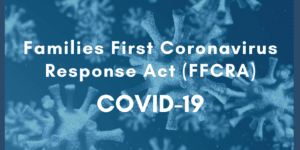 Signed into law on March 27, 2020, The Coronavirus Aid, Relief and Economic Security Act — or “CARES Act”, among other things, provides significant relief for small businesses. The Act injects roughly $2 trillion into the economy for coronavirus relief - providing roughly $350 billion in small business loans and an additional $500 billion in relief to distressed companies in distressed industries, expanding unemployment compensation, and providing rebate checks/tax relief to individuals, families and businesses. This relief is intended to last 3 months.
Signed into law on March 27, 2020, The Coronavirus Aid, Relief and Economic Security Act — or “CARES Act”, among other things, provides significant relief for small businesses. The Act injects roughly $2 trillion into the economy for coronavirus relief - providing roughly $350 billion in small business loans and an additional $500 billion in relief to distressed companies in distressed industries, expanding unemployment compensation, and providing rebate checks/tax relief to individuals, families and businesses. This relief is intended to last 3 months.
Small Business Loans – The CARES Act allocates up to $350 billion in emergency loans for small businesses with fewer than 500 employees (including sole proprietors, independent contractors and the self-employed) affected by COVID-19. These loans can be for up to $10 million and will be available through June 30, 2020. Proceeds from these loans may only be used on payroll and compensation costs, interest on debt obligations incurred prior to February 15, 2020, utilities, and/or rent payments. These loans will be guaranteed by the Small Business Administration and do not require any fee, collateral or personal guarantees from borrowers. Moreover, so long as these loans are used for the permitted purposes as previously stated, they will largely be forgiven (subject to any employee or wage reductions).
Click here for more info on terms and eligibility on these small business loans.
The CARES Act also expands the current Economic Injury Disaster Loan (“EIDL”) loan program through December 31, 2020. The Act not only increases the categories of businesses eligible for the EIDL program, but it also eliminates certain requirements of the current program, such as personal guarantees on loans for $200,000 or less, the inability to find credit elsewhere, and that businesses be operational for 1 year prior to applying. EIDL applicants can also be approved solely on their credit score, as opposed to tax returns, and will be eligible for a fully forgivable $10,000 emergency advance that can be received within 3 days.
To learn more about the changes to the EIDL program, click here.
Severely Distressed Sectors – The CARES Act, specifically, the Coronavirus Economic Stabilization Act (“CESA”), authorizes $500 billion for loans, loan guarantees, and other investments in support of eligible businesses. CESA earmarks $25 billion for passenger air carriers; $4 billion for cargo air carriers; and $17 billion for businesses that work in national security. The remaining $454 billion (and any unused amounts in the above categories) are to be used for the benefit of businesses, States and municipalities.
Specifically, these funds will go towards purchasing obligations or other interests directly from issuers of such obligations or other interests; purchasing obligations or other interests in secondary markets or otherwise; or making loans, including loans or other advances secured by collateral. Note, loans executed under CESA are not forgivable.
To learn more about terms and eligibility, click here.
Unemployment Insurance – The CARES Act Section, Relief for Workers Affected by Coronavirus Act (“RWACA”), provides funding for unemployment compensation (“UC”) to workers adversely impacted by COVID-19. RWACA extends the availability of UC to those workers who are not otherwise covered by State UC laws or that have exhausted State UC benefits.
Relief for Individuals, Families and Businesses –
Individuals and Families: Individual payments of $1,200 for individuals and $2,400 for couples. The payments are reduced for individuals with incomes over $75,000 (or $150,000 for couples) and provides an additional $500 per child. The payments are eliminated for those with an income over $99,000 ($198,000 for couples).
Businesses: Employers, including tax-exempt organizations but not governmental entities – will have the option to receive a refundable payroll tax credit equal to 50% of the first $10,000 in wages per employee (including certain health plan expenses).
For more information regarding eligibility, click here.
The U.S. Senate Committee on Small Business & Entrepreneurship has published a Guide to the CARES Act https://www.sbc.senate.gov/public/index.cfm/guide-to-the-cares-act
Small Business Owner's Guide to the CARES Act
We are actively monitoring the CARES Act and other COVID-19 legal issues that impact your business. For more information on issues or additional resources that can aid you, please contact us at .

Notwithstanding today’s earlier enactment of the $2 trillion stimulus package and the inclusion in that legislation of federal government funding programs assisting both “eligible” and small businesses, consideration needs to be given to the contract terms in all of your business contracts to issues excusing performance. The contract term that is now on everyone’s’ lips is the boilerplate term often referred to by its French name, called “Force Majeure” literally meaning “superior strength” and oftentimes incorrectly referred to as an “Act of God”. What you need to do, first, is to carefully understand the terms of your agreements, especially your commercial/retail lease and if there is a “Force Majeure” clause contained in it, to further determine how that clause and others within the applicable agreement may allow one party’s performance of a contract to be excused, either totally or partially.
In California, that is just the beginning of the analysis: For nearly 150 years an obscure law has remained on the books. The law is simply titled “Causes excusing performance,” is found in the California Civil Code (§1511) and provides in all its splendor: “The want of performance of an obligation … in whole or in part, or any delay therein, is excused by the following causes, to the extent to which they operate: … When it is prevented or delayed by an irresistible, superhuman cause, or by the act of public enemies of this state or of the United States, unless the parties have expressly agreed to the contrary …”
With the weight of California case authority suggesting that an “irresistible, superhuman cause” means an “Act of God,” that likely compels an analysis whether COVID-19 and the pandemic is, or is not, an “Act of God”. And in this upcoming Holy Season, not surprisingly the short answer is maybe yes, maybe no. There may be other terms in the agreement that would help in this analysis. While beyond the scope of this brief article and however one may perceive the precise origins of this terrible super-virus, the human spread and contagion don’t seem too God-like, but rather are clearly rooted in human actions. But look, the statute operates to excuse contract performance qualified by the following key nine words “unless the parties have expressly agreed to the contrary …” That then begs the question as to what is an express agreement to the contrary? Must the contract drafters have anticipated a flu-like pandemic, or what about some other type of pandemic?
Added to the analytic mix are additional principles of California contract law, specifically legal doctrines that further operate to excuse performance called “impossibility/impracticability” and “frustration of purpose”. In the former, contract performance may be excused when it is either not practicable or would require excessive and unreasonable expense, not already contemplated by the parties in their contract. In the latter, performance is excused if the purpose for entering into the agreement has been frustrated by a change in circumstances, eg., a stay-at-home order issued by the Governor that results in office/retail space being vacated.
If you have questions regarding a Force Majeure clause in your lease contract, please contact our COVID-19 Task Force - .

The FFCRA was signed into law on March 18, 2020, by President Trump to provide emergency relief and support in response to the COVID-19 (or “coronavirus”) pandemic. The three provisions of the FFCRA discussed below significantly change employees’ rights to paid sick leave and employers’ responsibilities for providing it. It is therefore crucial for employers that need to comply with the FFCRA (those with less than 500 employees) to understand the impact of this new legislation.
1. The Emergency Family and Medical Leave Expansion Act (EFMLEA):
The EFMLEA requires employers with fewer than 500 employees to provide to employees that qualify under the Act with up to 12 workweeks of leave. However, the first 10 days are unpaid (discussed further below) and the next 10 workweeks are paid leave. An employee is qualified if he/she has been employed with the employer for at least 30 days and is “unable to work (or telework) due to a need for leave to care for the son or daughter under 18 years of age of such employee if the school or place of care has been closed, or the child care provider of such son or daughter is unavailable.” Notably, this does not apply to employees who cannot work because of: a recommendation or order by a public official or health care provider to quarantine due to exposure to or symptoms of coronavirus; or the need to care for a family member who is in quarantine based on a recommendation or order due to exposure to or symptoms of coronavirus.
As mentioned, the first 10 days of a qualifying employee’s leave are unpaid under the EFMLEA; however, if the employee is already entitled to paid time off, such as accrued vacation time, medical, or sick days, they could apply those days to the 10 days of unpaid leave and should be paid for the applicable time. For the remainder of the 12-workweek period, employers are required to provide qualifying employees with two-thirds pay for the number of hours the employee would otherwise be scheduled to work, with a cap of $200 per day and $10,000 in the aggregate.
Further, the EFMLEA gives the Department of Labor (DOL) explicit authority to create regulations that exempt businesses with fewer than 50 employees from the requirements of the EFMLEA “when the imposition of such requirements would jeopardize the viability of the business as a going concern.” The DOL has not acted on this yet and updates will be provided as changes occur.
Additionally, businesses with fewer than 25 employees will not be required to restore the job of an employee who takes leave under the EFMLEA if: (i) the employee’s position no longer exists due to economic conditions and (ii) the employer makes reasonable efforts to restore the employee to an equivalent role with equivalent pay and benefits or if a position is not available, the employer must make reasonable efforts for a 1 year period to contact the employee if an equivalent position becomes available.
Because the EFMLEA is technically an amendment to the Family and Medical Leave Act of 1993 (FMLA), the rights provided to employees under the FMLA, such as enforcement and a prohibition on retaliation, apply equally to the EFMLEA. Similarly, since the FMLA limits the 12 workweeks of leave to any 12-month period, an employee that has already exhausted 12 workweeks of leave under the FMLA in a 12-month period would be prohibited from additional paid leave under the EFMLEA.
The EFMLEA is set to go into effect on April 2 and will remain in effect until December 31, 2020.
2. The Emergency Paid Sick Leave Act of 2020 (EPSLA):
While the EFMLEA does not really deal with an employee who is ill, the EPSLA was enacted to deal with this in some part, although there is some overlap. The EPSLA requires employers with fewer than 500 employees to provide up to two workweeks of paid sick leave to all employees for almost any issue related to the coronavirus. Under the EPSLA, full-time employees will receive up to 80 hours of paid sick leave while part-time employees will be entitled to paid sick leave pro-rated by the average number of hours worked over a two-week period. This will apply to all employees regardless of how long the employee has been employed.
Unlike the EFMLEA, paid sick leave under the EPSLA will apply to any of the following situations:
To self-isolate because the employee is diagnosed with coronavirus;
To obtain a medical diagnosis or care if such employee is experiencing the symptoms of coronavirus;
To comply with a recommendation or order by a public official or health care provider to quarantine due to exposure to or symptoms of coronavirus;
To care or assist a family member who is self-isolating because of a coronavirus diagnosis or who is experiencing symptoms of coronavirus and needs to obtain medical diagnoses or care; or
To care for a child if the child’s school or place of care is closed or the child-care provider is unavailable.
To self-isolate due to any other substantially similar condition specified by the Secretary of Health and Human Services.
If an employee takes paid sick leave under reasons 1-3 as listed above, the leave will be paid at the employee’s regular rate or the minimum wage (whichever is higher) and is capped at $511 per day and $5,110 in the aggregate. If the employee takes leave due to reasons 4-6 as listed above, that leave will be paid at two-thirds of the employee’s regular pay or minimum wage rate and capped at $200 per day and $2,000 in the aggregate.
Employers must make paid sick leave under the EPSLA available in addition to what is already provided by an employer’s existing paid leave policies. Further, employers are prohibited from changing their existing leave policies to avoid this requirement (and are also prohibited from conditioning EPSLA paid sick leave on an employee’s finding a replacement). Employees will also be able to first use paid sick leave under the EPSLA before using other accrued paid sick leave, and an employer cannot require the employee to use other paid sick leave first. Unused paid sick leave under the EPSLA will not carry over from one year to the next and will not need to be paid out at the end of an individual’s employment. Moreover, the EPSLA can be applied in conjunction with the EFMLEA by employees who qualify under both Acts to cover the first 10 days of unpaid leave under the EFMLEA.
Employers will be required to post a notice related to the EPSLA in the workplace. A model notice will be provided by the DOL by March 25. Employers who fail to comply with the EPSLA will be subject to penalties under the Fair Labor Standards Act. Like the EFMLEA, the EPSLA will go into effect on April 2 and will remain in effect until December 31, 2020.
3. Tax Credits for Paid Sick and Paid Family and Medical Leave:
The FFCRA does extend some relief to employers that are required to provide paid leave to employees under the EFMLEA or the EPSLA. These employers will receive payroll tax credits subject to certain limitations. Credits for wages paid under the EPSLA will be capped at $511 per day for days in which full pay is required, and $200 per day for days in which two-thirds pay is required and are available for up to 10 days per employee per calendar quarter. EFMLEA credits are capped at $200 per day (and at $10,000 with respect to all calendar quarters). These credits are refundable to the extent they exceed the employer’s payroll tax and are not available to employers that are also receiving credits under Internal Revenue Code Section 45S for paid family and medical leave. The FFCRA also extends tax credits to the self-employed, which carry additional considerations.
We are actively monitoring the labor issues and resources that become available to businesses during this time. For more information or if you have questions about labor or employment issues for your business, please contact Jeff Gersh at .
The legal professionals at Stubbs Alderton & Markiles, LLP will continue to monitor changes to legislation and publish updates as information becomes available. Please contact one of our attorneys at SA&M if you would like to discuss how these changes might affect your business.

COVID-19 EIDLs - General Overview
You can find the SBA requirements for COVID-19 related EIDLs at https://disasterloan.sba.gov/ela/Information/EIDLLoans.
To apply for an EIDL, please visit: https://disasterloan.sba.gov/ela/Account/Login?ReturnUrl=%2Fela%2FLoanApplication%2FStartApplication.
COVID-19 EIDLs – Additional Details and Key Takeaways
Application Filing Deadline: December 16, 2020.
Recent Updates
In a March 17, 2020 press release, the SBA Administrator issued revised criteria for states or territories seeking an economic injury declaration related to Coronavirus (COVID-19), which made it much easier for states and territories to request SBA assistance more broadly for their respective jurisdictions.
In sum, these relaxed criteria are expected to have the following immediate effects:
We are actively monitoring the resources that become available to businesses for relief during this time. For more information or if you have questions about resources as they become available, please contact one of our attorneys at
The legal professionals at Stubbs Alderton & Markiles, LLP will continue to monitor changes to legislation and publish updates as information becomes available. Please contact one of our attorneys at SA&M if you would like to discuss how these changes might affect your business.